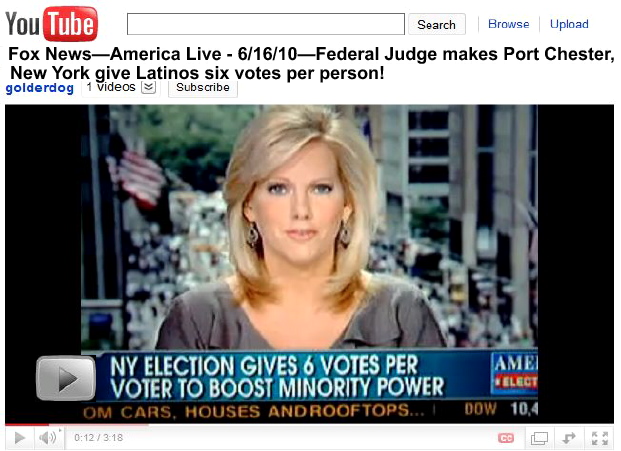
News
Behind the Headlines
Two-Cents Worth
Video of the Week
News Blurbs
Articles
Testimony
Bible Questions
Internet
Articles (2012)
Internet Articles (2011)
Internet Articles (2010)
Internet Articles
(2009)
Internet Articles (2008)
Internet Articles (2007)
Internet Articles (2006)
Internet Articles (2005)
Internet Articles (2004)
Internet Articles (2003)
Internet Articles (2002)
Internet Articles (2001)


![]()
A George W. Bush judicial
appointment has just wiped out the
constitutional precept of "one person, one vote." Hispanics,
who
present 46% of the population in rural Port Chester, New York went
to court to argue they are under-represented in the village govern-
ment. In the history of Port Chester, only two Hispanics have ever
run for office. The problem? Neither were elected. A large percent-
age of the Hispanic
community is either illegal, or they are minor
children who lack the legal right to vote. They sued.
Hispanics make up about 46% of the population of the Village of Port Chester, NY (a suburb of New York City). About 7% of the population is black. It would seem that, in any local election, 40% to 50% of the elected officials would be either Hispanic or Black since half of the popultion is either Hispanic or Black. The problem is, a large percentage of the Hispanic population in Westchester County, New York are illegal aliens and their minor children, most of whom were born in the United States. The most recent Hispanic candidate was Cesar Ruiz who, in 2001, won nearly 100% of the Hispanic vote—and still lost the election.
In 2006, the Bush-43 Justice Department under Bush's "illegal immigrant-blind" Hispanic Attorney General Alberto Gonzales sued the Village of Port Chester under the National Voting Rights Act of 1965, arguing that its one person, one vote system of electing six at-large board members denied the Hispanic population fair representation in the village. Under the at-large system, all of the voters in Port Chester were allowed to vote for all of the candidates, pretty much denying the minority candidate election since the Hispanic and Black voters were only about 30% of those registered to vote.
Gonzales had in mind
creating six voting districts wherein the residents of the solely or predominantly
Hispanic areas of Port Chester would be the only voters casting their
ballots for a Black of Hispanic board member who would represent them.
That, at least, would have made sense.  US
District Court Judge Stephen Robinson, a former US Attorney under
President Bill Clinton who was confirmed to the federal bench by
President George W. Bush on March 5, 2003, had other ideas. I guess
converting the at-large seats into precinct seats was too complicated
for him. Instead he decided to create a federal precedent on minority
voting that could be expanded by other social progressive judges to cover
county, and then State elections, and finally, to be completely fair to
"minorities," in federal elections as well. The fact that it
violates the precept of "one person, one vote," was of no consequence
to Judge Robinson.
US
District Court Judge Stephen Robinson, a former US Attorney under
President Bill Clinton who was confirmed to the federal bench by
President George W. Bush on March 5, 2003, had other ideas. I guess
converting the at-large seats into precinct seats was too complicated
for him. Instead he decided to create a federal precedent on minority
voting that could be expanded by other social progressive judges to cover
county, and then State elections, and finally, to be completely fair to
"minorities," in federal elections as well. The fact that it
violates the precept of "one person, one vote," was of no consequence
to Judge Robinson.
While Gonzales' Justice Department lawyers pushed for voting districts that would elect their own members, Robinson opted for a process known as "cumulative voting," in which each minority voter (nothing changed for majority voters) was given one vote for each seat on the ballot. The voter could cast one vote for each seat, or six votes for one seat. Cumulative voting, in the United States, is used frequently in corporate governance to elect board members. Its use is mandated in seven US States by federal judges in city council or school board elections. Cumulative voting was used by the State of Illinois to elect members to the Illinois House of Representatives from 1870 until 1980—which denied State residents equal representation under the law because only minority voters were granted multiple votes.
Cities which have used, or are using, cumulative voting are: Peoria, Illinois, for half of its school board. Chilton County, Alabama for its county council and its school board. Amarillo, Texas for its school board and College Board of Regents. A total of 50 US cities used cumulative voting to elect their school boards. A few use it to elect city commissioners.
There is nothing fair or equal about this form of voting since it penalizes the majority in favor of the minority in an electoral system deliberately designed to provide a majority government to the voters. What is most unfair about cumulative voting is that it violates a basic constitutional principle in American life: one person, one vote.

Copyright © 2009 Jon Christian Ryter.
All rights reserved.
